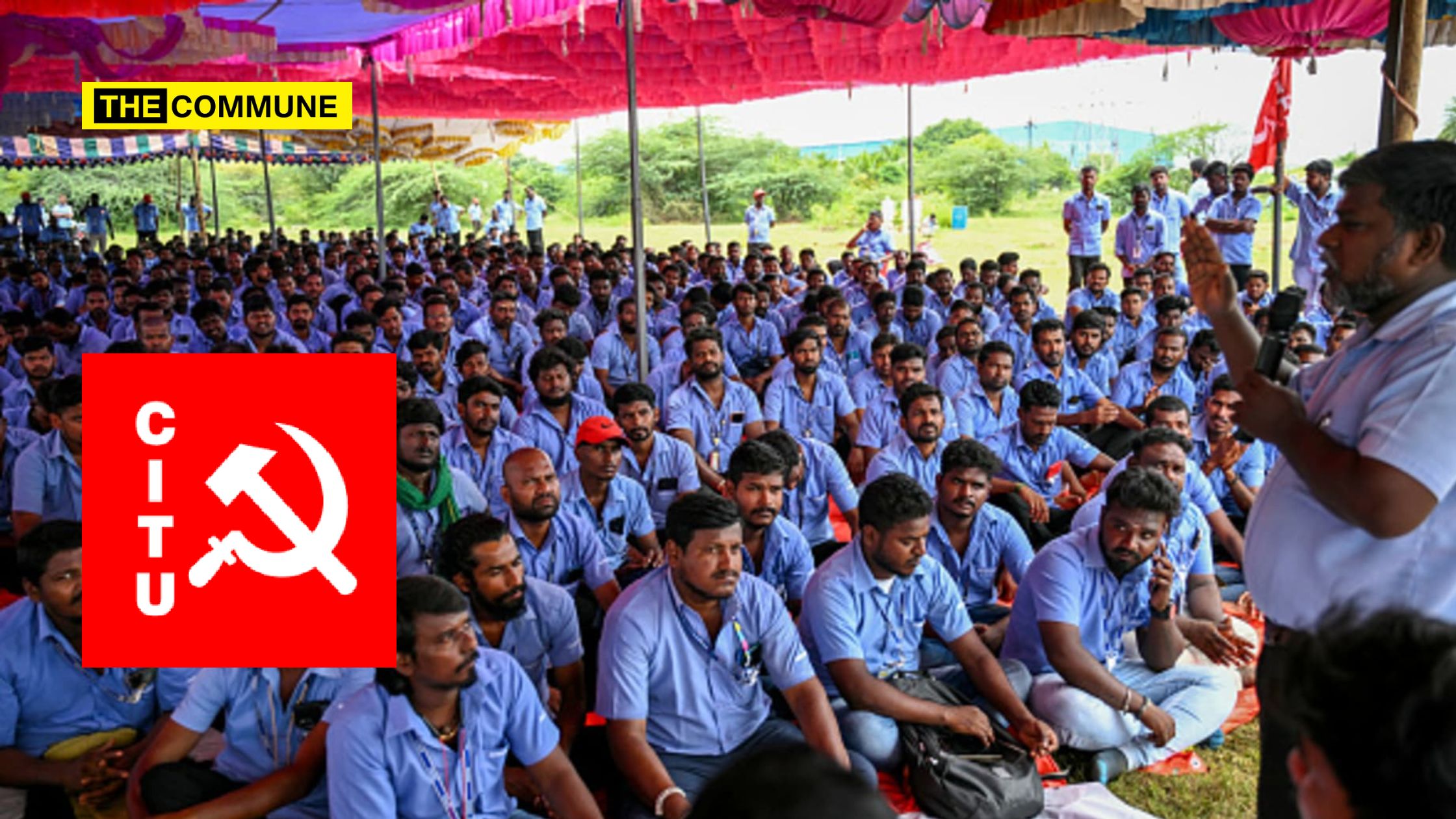
Industry confederations have raised concerns that foreign companies might be reluctant to invest in Tamil Nadu due to unnecessary issues raised by CITU, especially in the wake of the Samsung workers strike. The closure of numerous factories in Pudukottai during the labor strike has led to reports that industrial firms are hesitant to invest in the district, citing ongoing labor-related problems, despite they comply with legal regulations. This information comes amidst significant protests by Samsung employees.
#JUSTIN || "இளைஞர்கள் வேலை இழக்கும் அபாயம் ஏற்பட்டுள்ளது" | #SamsungProtest | #TNGovt | #SamsungWorkersProtest | #PolimerNews pic.twitter.com/4RUkE5Zpjz
— Polimer News (@polimernews) October 9, 2024
The ongoing strike at Samsung’s factory in Tamil Nadu is yet another example of how union-backed protests, especially those supported by Communist parties, can disrupt industrial operations in India. About 1,500 workers from the South Korean tech giant’s Chennai plant, one of Samsung’s two major factories in India, have halted production for weeks. The workers, represented by the newly formed Samsung India Labour Welfare Union (SILWU), are demanding better wages, improved working conditions, and, most importantly, formal recognition of their union.
This protest, which has seen daily gatherings of workers in Samsung uniforms, has led to significant production slowdowns, impacting the company’s ability to meet demand for consumer goods like air conditioners, refrigerators, and televisions. The Chennai plant contributes a substantial portion of Samsung’s $12 billion annual revenue in India, making the disruptions a costly affair.
The striking workers, supported by the Centre of Indian Trade Unions (CITU) – the labour wing of the Communist Party of India (Marxist) – are pushing for wage hikes, improved conditions, and union recognition. They argue that Samsung’s current wage of approximately ₹25,000 per month ($298) does not account for rising living costs. CITU has been vocal in accusing Samsung of mistreating workers by forcing them to meet unrealistic production targets and providing unsafe working conditions. While Samsung denies these allegations, the protests have escalated to the point where the company has had to rely on temporary workers to maintain minimal operations.
This isn’t the first time Communist-backed unions have disrupted international companies operating in India. These strikes raise concerns about India’s ability to retain foreign investment, particularly in manufacturing. Prime Minister Narendra Modi’s efforts to attract foreign manufacturers—positioning India as an alternative to China—are now at risk as these protests continue to generate negative publicity and disrupt business operations.
Impacts Of Unnecessary Labor Strikes
Unnecessary labor strikes can have several negative consequences on employment and investment in countries like India, which has a large and diverse labor force. Here are some key impacts:
1. Reduced Investor Confidence: Frequent strikes can create an unpredictable business environment, discouraging both domestic and foreign investors from committing resources.
2. Job Losses: Prolonged strikes can lead to layoffs or the closure of businesses, resulting in job losses and increased unemployment rates. Example: Sterlite Copper in Tuticorin
3. Economic Slowdown: Strikes can halt production, causing delays in output that may negatively impact the overall economy, affecting both growth and stability. This situation can lead to losses for India, as seen in the rise of Pakistan’s copper exports to China amid increased net copper imports by India. The protests in Thoothukudi, led by NGOs and activists like The Other Media (TOM), contributed to the closure of Sterlite Copper, highlighting how social unrest can influence market dynamics.
4. Supply Chain Disruptions: Strikes can interrupt supply chains, impacting not only local businesses but also international partners, leading to broader economic ramifications.
5. Increased Costs: Businesses may face increased costs due to lost production, hiring temporary workers, or paying overtime, which can erode profit margins and deter investment.
6. Labor Relations Tensions: Ongoing strikes can foster a confrontational dynamic between employers and employees, complicating future negotiations. As a result, companies may seek more favorable and protective environments in other states. Currently, Andhra Pradesh and Uttar Pradesh are competing for these opportunities.
7. Sector-Specific Decline: Certain industries may be more vulnerable to strikes, leading to a decline in specific sectors, which can affect regional economies and job opportunities.
8. Reputational Damage: A history of strikes can tarnish a country’s reputation as a stable place for investment, making it less attractive to potential investors.
9. Impact on Skilled Workers: Skilled workers may leave for more stable job markets, leading to a brain drain that undermines long-term economic growth.
Settlement Reached But CITU Demands Union Recognition
After multiple discussions between Samsung India’s management and the workers at its Sriperumbudur manufacturing facility, a settlement has been reached regarding the ongoing strike. However, the Centre of Indian Trade Unions (CITU) announced that the strike would continue, citing the company’s refusal to recognize the newly formed Samsung India Workers’ Union (SIWU) as a significant unresolved issue.
The discussions, which took place on 7 October 2024 at the Tamil Nadu Secretariat, involved Labour Minister CV Ganesan, Industries Minister TRB Rajaa, and MSME Minister TM Anbarasan. The company and the workers’ committee signed a Memorandum of Agreement (MoA). According to the MoA, Samsung agreed to implement a temporary “Productivity Stabilisation Incentive” of ₹5,000 per month, effective from October 2024 to March 2025, along with future wage hikes to be discussed in the upcoming wage negotiations for the 2025–2026 financial year.
Industries Minister Rajaa acknowledged that Samsung’s management had met most workers’ demands, including wage increases and additional benefits. He expressed optimism that the strike would soon end and emphasized the importance of Samsung’s role in Tamil Nadu’s journey toward becoming a trillion-dollar economy.
Despite these developments, CITU district secretary E Muthukumar confirmed that the strike would continue until Samsung officially recognized the SIWU. He argued that the agreement was signed only with a workers’ committee, which is seen as more favourable to the company and not with the union.
The strike, which began on 9 September 2024, initially involved over 1,000 out of the 1,800 workers at the Sriperumbudur plant. Established in 2007, the facility manufactures consumer electronics such as televisions, washing machines, and air conditioners.
On 9 October 2024, tensions escalated as police arrested several protesting workers and union members, dismantling a protest pandal without notice. Finance Minister Thangam Thennarasu assured us that the detained workers had been released and clarified that the government’s actions aimed to manage protests held without prior permission. He reiterated that the matter of union recognition was sub-judice and was awaiting a decision from the Madras High Court.
Potential Relocation Of Samsung’s Sriperumbudur Plant Amid Labor Unrest – A Loss To TN
Meanwhile, reports have surfaced that Samsung may be considering relocating its Sriperumbudur plant, with Uttar Pradesh, Andhra Pradesh, and Gujarat reportedly vying to host the facility. Sources suggest that Samsung could shift operations to its Noida plant due to the ongoing labour unrest, though no official confirmation has been made. Samsung has denied any relocation plans, stating that all worker demands except for union recognition have been addressed.
The utter incompetence of CM @mkstalin led #DMK Govt. to ensure #Samsung Plant move away from Tamil Nadu.
They’re already in talks with Gujarat, Andhra Pradesh & Uttar Pradesh Governments to shift out.
Wherever #Communists enter the place is ensured to be reduced to ashes. pic.twitter.com/IzN8YILhAS
— Dr.SG Suryah (@SuryahSG) October 9, 2024
Despite these assurances, hundreds of workers protested, insisting on union recognition. Videos showing police intervention at the protest site have gone viral on social media, further fueling tensions. Political leaders, including those from the ruling DMK alliance parties, have expressed solidarity with the workers.
The Tamil Nadu unit of the Communist Party of India (Marxist) condemned the police crackdown, with MP Su. Venkatesan criticised the suppression of workers’ democratic rights.
Subscribe to our Telegram, WhatsApp, and Instagram channels and get the best stories of the day delivered to you personally.




